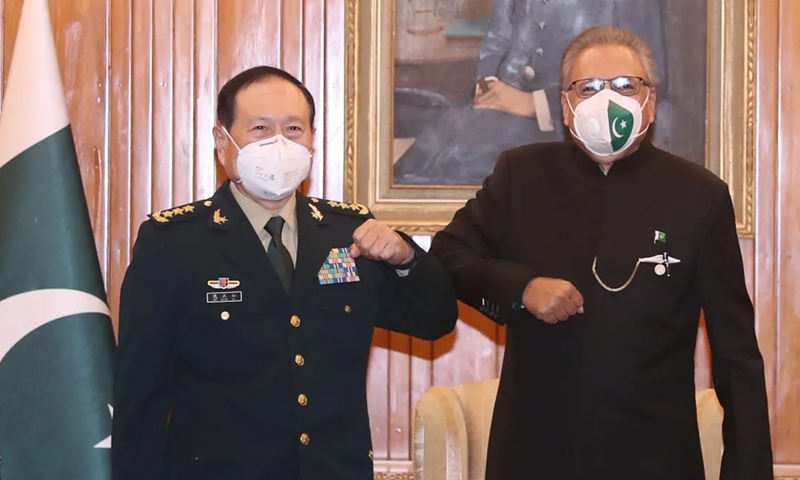Chinese defense chief's Nepal, Pakistan tours 'of practical meaning' for security in western China

Photo: Chinese Ministry of National Defense
Chinese State Councilor and Defense Minister Wei Fenghe met with Pakistan's top officials during his visit to the country, which followed a day-long trip to Nepal, and observers believe the tour to key neighbors in the Southwest border are of practical meaning to safeguard regional security.
Wei met with Pakistani President Arif Alvi and Prime Minister Imran Khan in Islamabad and discussed a wide range of topics, including the building of the China-Pakistan Economic Corridor and defense cooperation, according to the Chinese Defense Ministry's WeChat account on Tuesday.
Wei hailed the uniqueness of bilateral "all-weather" strategic partnership and deepening cooperation and mutual support on issues of key interest. China is willing to increase mutual trust and coordination to lift the relationship of the two militaries, face risks and challenges together, and safeguard regional peace and stability together, Wei said.
Khan noted the visit amid the pandemic underlines Chinese government and military's support to Pakistan.
The defense ministry said that Wei had also met with Chief of the Army Staff General Qamar Javed Bajwa. Pakistani media reported that they discussed "matters of mutual interests, affairs of regional security and enhancement in defense cooperation" and signed a new memorandum of understanding (MoU) for military cooperation.
Bajwa thanked China's unwavering support to Pakistan on all key issues at regional and international forums. "Pakistan Army greatly values our time-tested and brotherly relations with China. We have been standing together all along, and our relations will be no different in wake of future challenges," he said.
During Wei's visit to Nepal, he also discussed international and regional situations and bilateral diplomatic and military relations with Nepal's Chief of Army Staff General Purna Chandra Thapa.
India, which has territorial disputes with Pakistan and Nepal, has been paying close attention to Wei's tour, deeming it a move to confront India as China and India are also going through a military standoff due to border disputes.
But Chinese observers said India has over-evaluated its importance because international and regional situations must be on the agenda of China-Nepal, China-Pakistan military leaders' communications.
China is a friendly neighbor of Nepal and Pakistan, and Wei's visits are more to enhance the relationship and deepen cooperation, and lift military mutual trust, Qian Feng, director of the research department at the National Strategy Institute at Tsinghua University, told the Global Times on Tuesday.
China, as a major country, is bound to support Nepal and Pakistan morally and diplomatically. The tour is a warning to some anti-China hardliners in India, who do not reflect on their own mistakes but try to sow discord between other countries and keep stirring up trouble in the region, Qian said.
The tour is also part of China's neighborhood diplomacy which is also seen in State Councilor and Foreign Minister Wang Yi's latest tour. Wang visited Russia, Kazakhstan, Kyrgyzstan and Mongolia in September. In October, Wang visited Cambodia, Malaysia, Laos and Thailand. From November 24-27, he visited Japan and South Korea.
Neighboring countries are a priority of China's diplomacy, which is of special importance in a special 2020, Qian said, noting the pandemic as one reason.
Neighboring countries are important for China to prevent a coronavirus resurgence, and helping them shake off the virus is helping others and helping China itself, Qian explained.
China is also facing hostility and strategic containment from countries like the US and Australia. A stable relationship with neighboring countries can help China deal with a complicated international environment, Qian said, citing Wei's attendance to defense ministers' meeting of member states of Shanghai Cooperation Organization in Russia as another example.
Russia, Nepal and Pakistan are all traditional friendly countries of China.
The situation in South Asia also went through major changes, and the China-India standoff had threatened the security of China's southwestern borders. Qian believes a close relationship with southwestern neighbors will help China maintain regional security, and their participation in the China-proposed Belt and Road Initiative underlines their importance in pushing forward the framework amid major changes in global situation.
